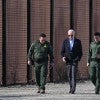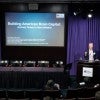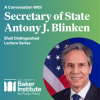
De Lange preconference launch event features film screening, panel discussion
A launch event for Rice University’s biennial 2024 De Lange Conference featured a film screening and panel discussion at the Asia Society Texas Center Jan. 24.

De Lange preconference launch event features film screening, panel discussion
A launch event for Rice University’s biennial 2024 De Lange Conference featured a film screening and panel discussion at the Asia Society Texas Center Jan. 24.

Mexico, US relationship examined in latest edition of Mexico Country Outlook report
The United States-Mexico border will be the greatest source of conflict between the two nations in 2024 — particularly with elections in both countries this year — according to the latest edition of the Mexico Country Outlook report from Rice University’s Baker Institute for Public Policy.

Rice University’s biennial De Lange Conference will address the future of biology, technology and climate change through a series of lively interventions and debates Feb. 9-10 at the university’s Baker Institute for Public Policy.

Rice psychology, immigration expert at the border, available for interviews
Luz Garcini, a Rice University expert who focuses on the psychological impacts of migration on refugees and immigrants, will be at the Texas-Mexico border this week with the American Psychological Association’s Presidential Task Force on Immigration.

The increasing use of carbon nanotubes (CNTs) — and a proposal in the European Union to ban the entire class of materials — highlights the need for an updated and standardized approach to assess human and environmental impacts of CNTs and products that contain them, according to a new collaborative study co-authored by Rice University researchers.

Houston’s potential to lead on brain health in focus at Baker Institute event
The Colloquium on Brain Capital Dec. 5 brought together experts from Rice University’s Baker Institute for Public Policy and the university’s Office of Innovation to discuss Houston’s potential to lead brain health research.

Discussions of international relations and the perilous state of the world were front and center as three former U.S. secretaries of state shared their perspectives on global affairs, democracy and diplomacy at the Rice University Baker Institute for Public Policy’s 30th anniversary gala Oct. 26.

Rice Baker Institute’s David Satterfield appointed special envoy to Middle East by President Biden
David Satterfield, director of Rice University’s Baker Institute for Public Policy and former U.S. ambassador to Lebanon and Turkey, was appointed Special Envoy for Middle East Humanitarian Issues by President Joe Biden Oct. 15 to coordinate diplomatic efforts to address the critical humanitarian issues resulting from Hamas’ terrorist attack on Israel.

Baker Institute experts available to discuss Israel-Hamas war
Experts from Rice University’s Baker Institute for Public Policy are available to discuss the Hamas attack on Israel, Israel’s response and the implications for foreign policy and global energy developments.

Energy and foreign policy experts will examine the lessons learned from the 1973 oil embargo and their renewed relevance for today’s energy crises — triggered by Russia’s invasion of Ukraine and the risks presented by climate change — for countries, policymakers, companies and the public on Oct. 17 at Rice University’s Baker Institute for Public Policy.

U.S. Secretary of State Antony Blinken visited Rice’s campus Oct. 3 to discuss foreign policy and diplomacy at an event held at the Shepherd School of Music’s Stude Concert Hall.

Secretary of State Blinken to join foreign policy discussion at Rice’s Baker Institute Oct. 3
U.S. Secretary of State Antony Blinken will join Rice University Baker Institute for Public Policy Director David Satterfield and Honorary Chair James A. Baker III to discuss the country’s foreign policy strategy at an event at Rice Oct. 3.

Rice’s Baker Institute and Baker Botts to host global energy summit Oct. 4-5
The Baker Institute Center for Energy Studies at Rice University and Baker Botts L.L.P. will co-host their seventh annual energy summit Oct. 4-5. The two-day conference at Rice’s James A. Baker III Hall will feature international and domestic perspectives through keynote addresses and discussions with energy experts in industry, government and academia.

Baker Institute expert discusses economic burden of American brain health at UN General Assembly
The economic burden of brain and mental health-related disorders — along with the need to fuel innovation in the field so the U.S. can continue to compete economically — has prompted the need for a brain science-inspired industrial strategy that will build America’s “brain capital,” argues an expert from Rice University’s Baker Institute for Public Policy.

Baker Institute report: European energy at risk of overdependence on unreliable supply
European buyers’ reluctance to sign long-term liquefied natural gas (LNG) contracts risks repeating energy challenges from Europe’s previous overreliance on Russian natural gas as well as further burdening consumers who are already paying billions more for energy than necessary, according to a new report from Rice University’s Baker Institute for Public Policy.